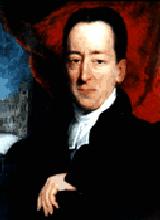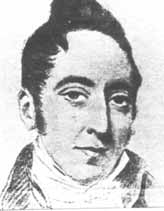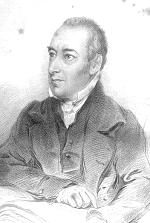
José María Blanco y Crespo (July 11, 1775-May 20, 1841), also known as Joseph Blanco White, was a poet who composed in both in Spanish and English and also a literary critic, novelist, essayist, journalist and religious controversialist. In his political writing he was an early advocate of Spanish American independence. In his religious writing he wrote as a rationalist critic of orthodox theology and influenced both Anglican and Unitarian thought.
Blanco White was always on the move, physically and spiritually, always questioning his beliefs, and always ultimately obedient to the dictates of his heart and mind, even when they required him to give up his country, church, status and privileges. He went from being a Roman Catholic priest in Spain to an exile in England, from being an Anglican convert to—in the last years of his life—a Unitarian. He wrote to a friend, “I never allowed myself to put opinions upon the shelf as settled for ever”.
José María was born in Seville, the eldest of four children. His father, Guillermo Blanco (William White), was of an Irish Catholic merchant family who had settled in Spain to avoid religious persecution. His mother, María Gertrudis Crespo, was of an impoverished Spanish aristocratic family. Not a talented businessman, Guillermo was known for his saintly public spirit. In the evenings he risked his health at hospitals helping in “the dirtiest tasks that others would refrain from doing.” Every Sunday he took his son on an exhausting round of devotions at the cathedral and other churches. Guillermo hoped his son would take on the family business, but José María disliked his mercantile apprenticeship. His devout mother arranged for him to be taught Latin and rejoiced when twelve-year-old José María, eager to escape copying letters and invoices, declared his vocation for the priesthood.
Blanco studied philosophy briefly at the Dominican college of Santo Tomás, but rebelled against its scholasticism. In 1790 he transferred to the University of Seville. There he showed extraordinary intelligence, and a distinguished older student, Manuel de Arjona, became his mentor. Arjona introduced him to the intellectual elite of Seville and guided him in the study of European literature and thought. With two other students they formed the Academia de Letras Humanas, within which they studied and adopted the late enlightenment ideals of their patron, Juan Pablo Forner. Thanks to his Irish family and the use of English in his father’s business, Blanco was fluent in English. As a student he also learnt French and Italian. He began translating English poems into Spanish, and composing poetry. He gained his university degree with distinction. In spite of serious misgivings, he was ordained a priest at the end of 1799. Because of his accomplishments in both intellectual and religious studies, he was appointed to a royal chaplaincy.
Doubts about the validity of Christian doctrine, and religion itself, forestalled Blanco’s rise in the Church. A chaplain to nuns, he became convinced that convent life was demoralizing and unhealthy. He also began to meet people opposed to the Roman Church’s domination of Spanish society. As a young priest he continued say Mass and to preach regularly. He tried to hide his growing skepticism from his mother and also worried about the Inquisition which, though weaker than it had earlier been, still monitored the faith of the clergy. He later wrote of this period, “[B]elieving religion a fable, I still found myself compelled daily to act as a minister and promoter of imposture”.

Blanco began to consider the possibility of leaving Spain, but was deterred by his love for his parents, who “would feel devastated if I did so”. In 1806 he moved to Madrid. The following year, 1807, he was appointed religious instructor to students and to the Board of the new progressive Pestalozzian school. At this time Blanco had a secret liaison with Magdalena Esquaya. In 1812, after he had left Spain, he learned that she was in need and had given birth to his son, Fernando. Blanco helped to support her until her death in 1816, paid for his son’s education and obtained a post for him in the British Army.
In 1808 the people of Madrid rioted against the French invasion led by Napoleon Bonaparte. Though Blanco was in sympathy with ideals of the French Revolution, his patriotism was stronger. He joined the Spanish rebels in Seville, where a provisional Spanish government, “la Junta” (the Board), had been established. With the help of friends he started publication of a political magazine, El Semanario Patriótico (The Patriotic Weekly). Because it was critical of Junta policy, the paper was soon closed by censorship authorities. Unhappy with the provisional government, which he considered incapable of either winning the war or modernizing Spain, and in anguish wearing the robes of priestly office in which he no longer believed, Blanco finally decided to leave Spain. In 1810 he boarded a ship in Cádiz and sailed to England, never to return.
Arrived in England, Blanco made contact with political figures interested in the events in Spain, especially Henry Fox, Lord Holland. A few weeks later Blanco started a magazine, El Español (The Spaniard), which was distributed in Spain by the English until the French expulsion. For this work the British government awarded him a modest pension. While writing for El Español, Blanco entered the debate over the future of the Spanish colonies in America. At first he defended limited autonomy, but he soon concluded that appeals for mutual understanding were useless. He then recommended the complete independence of Latin America as the only feasible possibility. Upon the advice of Lord Holland, Blanco had moderated his criticism in El Español of the Junta, but he forthrightly expressed his views on Spain and America. His closest friends in Spain turned against him. They accused him of treason.
Blanco’s observation of Protestant reform in England and a reading of Paley’s Natural Theology led him to reconsider his rejection of religion. In 1812, in attendance at an Anglican service, he was moved to tears by the singing of Joseph Addison’s hymn “When All Thy Mercies O My God, My Rising Soul Surveys.” He converted to Anglicanism a few days later and, in 1814, took Anglican orders. He preached on occasion, but never held an Anglican living.
Finding his pension insufficient to support his son’s education, Blanco sought additional income. From 1815-17 he tutored Lord Holland’s son. In 1821-22 he wrote for the New Monthly a series of portraits of life and society in the Spain he had known as a boy and a young man. Highly praised by critics, the articles were collected as Letters from Spain in 1822. Blanco’s knowledge of and acute descriptions of distinctive Spanish customs made the book an enduring sociological study of Spain at the end of the 18th and the beginning of the 19th century. From 1823-25 he edited Variedades, a magazine for Spanish America. This work brought him some financial success.
In 1825 friends persuaded Blanco to enter the British debate on Catholic Emancipation. Though he later regretted his part in this campaign, he argued in Practical and Internal Evidence against Catholicism that “sincere Roman Catholics cannot conscientiously be tolerant.” At the same time he preached religious pluralism, in Variedades, to the new countries writing constitutions in Spanish America. As a result of Evidence, in 1826 Oxford University granted Blanco an M.A. He was also granted a membership at Oriel College. He moved to Oxford and joined the Noetics, a group of artists and intellectuals linked to the College and the University. One of his friends was Oxford Movement leader John Henry Newman, who later converted to Catholicism and become a celebrated cardinal. Ironically a number of future Catholics studied Roman Catholicism under Blanco, the former Catholic.
Another Oriel College friend, Richard Whately, moving in a different direction from Newman, so hated intolerance and dogma that he for a while advocated disestablishment of the Church of England. In 1829 he and Blanco campaigned in favour of the Roman Catholic Relief Act, which removed the anti-papal oath preventing Roman Catholics from holding public office. Blanco justified his new position on the grounds of preventing civil war in Ireland. “[B]y yielding without a desperate and unbecoming struggle,” he wrote, “we shall disarm our enemies and gain additional respect to the establishment.”
Blanco’s conception of the evils of religion—the use of theology for political ends, the use of mysticism to manipulate emotion (which he called “animal affection”), the false linkage of truth and antiquity, and the false assumption that Christ came to tell people what to think rather than how to live—were well known. Some of these criticisms were also to be found in his friend Renn Dickson Hampden’s 1832 anti-scholastic Bampton Lectures. In 1836 members of the Oxford Movement attacked the Lectures. They accused Hampden of deriving his ideas from Blanco, by that time a Unitarian.
At Oxford Blanco had become disenchanted with Anglicanism when he found it no less dogmatic and spiritually narrow-minded than Catholicism. No longer comfortable at Oxford, in 1832 he accepted an invitation to live in Ireland with Whately, recently appointed Anglican Archbishop of Dublin. Living as a guest of the archbishop, Blanco was increasingly concerned to recover the original spirit of Jesus and the first Christians, without theology or dogma. He questioned the Biblical foundation of Church doctrines. He became convinced that any scriptural passage which allowed of several meanings could not convey essential information. Otherwise, God would be “setting a trap for men”. Thus, “the acknowledgement of the Divinity of Christ cannot be one of the essentials of Christianity.” Unwilling to submit the manuscript of his latest work, Observations on Heresy and Orthodoxy, to Whately for approval, in 1835 Blanco moved to Liverpool to join the Unitarians.

In Observations Blanco rejected churches established by any government and also numerous theological doctrines as contrary to the spirit of Jesus and the Gospels. “Is there any meaning of the Bible that is accessible to Man, but [that] in the mind of each human being who reads it?” he wrote. “Therefore, when someone proclaims his intention of defending the ‘Christian truth’, he only expresses his resolution to defend his own ideas, spawned by the words from the Bible. In the current situation, there is no other Christian Truth for us”.
In Liverpool Blanco at first attended James Martineau‘s services at the Paradise Street Chapel and John Hamilton Thom’s at the Renshaw Street Chapel on alternate Sundays. He greatly admired Martineau whom he convinced not to require belief in miracles as a test of Christian belief. But it was Thom who became Blanco’s pastor, disciple, and literary executor. In his journal Blanco wrote, “I had never witnessed anything so really sublime as the whole worship in which I was joining. . . . I heartily thank God for having been made acquainted with the Unitarian worship. I have seen nothing superior, nor even equal to it.”
Blanco exchanged letters with American Unitarians Andrews Norton and William Ellery Channing and also with John Stuart Mill, whose philosophy he found attractive. He contributed literary articles to Mill’s London and Westminster Review. In spite of his age, Blanco studied German in order to read Fichte and other contemporary German philosophy and literature. He also began to write again in Spanish, mainly poetry, and even started a novel that he left unfinished, Luisa Bustamante.
Blanco had never enjoyed good health and had a tendency to hypochondria and depression. Growing more and more ill, in 1837 he stopped leaving his home. Having an intense need for affection and friendship, but feeling weak and alone, he contemplated suicide. His son, an officer of the British army in India, visited him. But though the visit brought him temporarily out of this dejection, by early 1841 the state of his health was desperate. Unitarian friends took him to the residence of a Unitarian merchant, William Rathbone, so that he could get medical attention. He died on May 20, 1841, an unrepentant heretic. In his last words he affirmed, “God to me is Jesus, and Jesus is God, of course, not in the sense of the Divines”.
In his funeral sermon at Renshaw Street Chapel, James Martineau said, “No common soul dwelt within that lifeless form: a vast knowledge, a rare wisdom, a rich experience, a devout trust, are plunged into the unfathomable night, and hidden from our eyes”. A tablet in the cloister of Ullet Road Church, Liverpool memorializes Blanco White.
His most famous English poem is the sonnet, “Mysterious Night.”
Mysterious Night! when the first man but knew
Thee by report, unseen, and heard thy name,
Did he not tremble for this lovely frame,
This glorious canopy of light and blue?
Yet ‘neath a curtain of translucent dew,
Bathed in the rays of the great setting flame,
Hesperus with the host of heaven came,
And lo! Creation widened on his view.
Who could have thought what darkness lay concealed
Within thy beams, O Sun! or who could find,
Whilst fly and leaf and insect stood revealed,
That to such endless orbs thou mad’st us blind!
Weak man! Why, to shun death, this anxious strife?
If Light can thus deceive, wherefore not Life?
Until a few years ago, largely because of his anti-Catholic opinions and his position on Latin America, Blanco White’s life and work were neglected, even despised by influential scholars, in pre-democratic Spain. His reputation is currently enjoying a renaissance there. Juan Goytisolo, Spanish poet and writer, champions his work both as a writer and as a daring intellectual heretic who challenged the power of the Catholic Church and the political and intellectual establishments of his time. In June, 2001, the first international Congress in Spain on the life and work of Blanco White was held in Madrid.
Sources
The major collections of letters, journals, notebooks, manuscripts, sermons and other papers of Blanco White are in the Liverpool University Library; at Harris Manchester College, Oxford; and in the University Library, Princeton, New Jersey. Some other correspondence is in the Holland House papers at the British Library, in the Lambeth Palace Library, and at Oriel College, Oxford. Some manuscript poems and a discourse to the Academia de Letras Humanas are in the Biblioteca Universitaria, Seville. There is more detailed information on Blanco’s papers in Papers of British Churchmen 1780-1940 (1987). His works written in England are translated into Spanish as Obra inglesa de Blanco White (1972, revised 1998) by Juan Goytisolo, who also provides a long and fiercely apologetic critical introduction and notes. This awakened interest on Blanco in his own homeland. A selection of Blanco works is Vicente Llorens, editor, José María Blanco White. Antología (1971). This includes a biographical introduction, comprehensive bibliography and notes by the editor.
There are seventeen early Blanco poems in Poesías de una Academia de Letras Humanas de Sevilla (1797). Among significant works not mentioned in the article above are Preparatory Observations on the Study of Religion (1817); Vargas, A Tale of Spain (1822); ‘Spain’, Supplement to the Fourth, Fifth, and Sixth Editions of the Encyclopedia Britannica, vol. 6 (1824); a translation into Spanish of William Paley, Evidencias del cristianismo (1825); The Poor Man’s Preservative against Popery (1825); Second Travels of an Irish Gentleman in Search of a Religion (1833); and articles for the Christian Teacher (1837-43) on history, philosophy, religion, and literature. His literary criticism of Shakespeare and Cervantes show his astonishing knowledge of both languages and their literature. Also remarkable are his innovative studies of Spanish classical literature and his articulate defense of Romanticism.
Blanco’s 3 volume autobiography, The Life of Joseph Blanco White Written by Himself (1845), edited by John Hamilton Thom, includes many letters and extracts from his journal. Biographies include Mendez Bejarano, Vida y Obras de Blanco y Crespo (1920); Martin Murphy, Blanco White: Self-banished Spaniard (1989); and Anthony J. Cross, Joseph Blanco White: Stranger and Pilgrim (1984). Articles on Blanco White in English: Anthony J. Cross, ‘Moving Martineau off the Miracles: the Role of Joseph Blanco White’, Faith and Freedom (Autumn and Winter 1995) and Gerald Parsons, ‘A forgotten debt: John Colenso and the “Life” of Blanco White’, Faith and Freedom (Autumn/Winter 1998). Some recent articles in Spanish: Eduardo Subirats, “Blanco White, nuevamente desaparecido” (Blanco White, missing again), El Mundo del siglo XXI (November 13, 1997); José María Ridao, “La visión política de Blanco White” (Blanco White’s political vision), El Viejo Topo (June 2000); Santos Sanz Villanueva, “Maldito y olvidado” (Damned and forgotten), El Mundo del siglo XXI (June 5, 2001); Francisco Chacón, “El mejor escritor de principios del XIX es un fantasma” (The best writer from the early 19th century is a ghost), El Mundo del siglo XXI (June 5, 2001); and Juan Goytisolo, “Blanco White y la desmemoria española” (Blanco White and the Spanish lack of memory), El País (June 5, 2001). See also Vicente Llorens, Liberales y románticos. Una emigración española en Inglaterra (Liberals and Romantics. A Spanish Immigration to England) (1968).
Article by Jaume de Marcos and Peter Hughes
Posted April 6, 2002